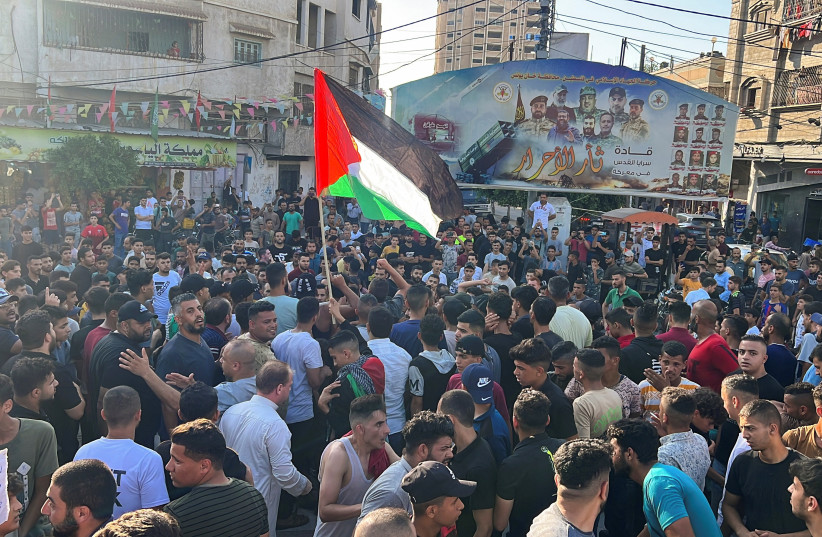While many of us have been preoccupied with the state of the Israeli judicial reforms, wondering whether or not our country is on the brink of civil war, Israel’s enemies have been busy bolstering, buttressing, and uniting.
Last week, members of Fatah, Hamas, Palestinian Islamic Jihad (PIJ), The Popular Front for the Resistance of Palestine, and other Palestinian resistance movements met in Cairo for a unity conference. The effort to find rapprochement was aimed at helping bridge the tremendous breach between Hamas-controlled Gaza and the Fatah-controlled West Bank (Judea and Samaria).
This may well prove to be a very worrying development. Since the signing of the Oslo Accords, there had been at least some level of cooperation between the Palestinian Authority (Fatah), and the IDF. If these rival factions, most of which are backed by Iran, unite across Gaza and the West Bank, Israel will be facing a much more formidable threat to every single one of its cities.
In times of hostility, most Israelis have less than 60 seconds to make it to their bomb shelters. Think of how that time is reduced to a mere 15 seconds in neighborhoods that border Gaza, such as Sderot. Now imagine the capability of Iranian-controlled Hamas or Palestinian Islamic Jihad to reach from Kalkilya to Kfar Saba, from Tulkarm to Netanya from Ramallah to Modi’in.
As the meeting in Cairo adjourned, PA head Mahmoud Abbas reportedly said, “We must return to a single state, a single system, a single law, and a single legitimate army.”
He added that he considered the “meeting of the general secretaries of the Palestinian factions a first and important step in continuing our dialogue, which we hope will achieve the desired goals as soon as possible.”
First off: Why are they doing this? For one, Abbas, despite all his bravado, knows how to read the Palestinian street. This 87-year-old premier, now in his 18th year of a four-year term, knows that he is no longer welcomed nor appreciated. When he visited Jenin after some recent Israeli incursions that had left three Palestinian Islamic Jihad fighters dead, he was greeted with hostile chants of “Get out! Get out!”
Wherever Abbas travels, he is surrounded by a flank of well-armed bodyguards. Perhaps because the PA (established nearly three decades ago as a result of the Oslo Accords) works with Israel to arrest rival factions to its power, it is looked upon as an enemy collaborator, and Abbas is not stupid.

Hamas, Fatah, and the PA
According to a March 2023 poll by the Palestinian Center for Policy and Survey Research, 83% of Palestinians say they are against the surrender of armed groups and their weapons to the PA in order to receive protection against Israeli assassination, while 12% are in favor.
Further: The vast majority (87%) said the PA does not have the right to arrest members of these armed groups in order to prevent them from carrying out attacks against Israel, nor to provide them with protection – only 8% disagreed.
However, the resentment against Fatah is festering. To understand this, one need look no further than the streets of Lebanon, regarding which the United Arab Emirates, Saudi Arabia, Bahrain, Qatar, Kuwait, Germany, and the United Kingdom have issued travel warnings. The popularity of Islamist groups is rising, and irrespective of whether they be Sunni or Shia, both can depend on Iran and Qatar for support.
Violence erupted in the Ain el-Hilweh Refugee Camp (the largest Palestinian refugee camp in Lebanon) at the beginning of March, when Fatah member Mahmoud Zbeidat was killed by a member of the Islamist group Harakat al-Shabab al-Mujahideen. To avenge the attack, another member of Fatah killed another member of Al-Shabab.
Ain el-Hilweh, with close to 70,000 inhabitants, is located in the city of Sidon. Clashes are not uncommon there, and at least 11 people have been killed recently. Today, most of the clashes are between Fatah and the Islamist Jund al-Sham. Some 2,000 people have left the camp and are now homeless.
The outlook for unity on the ground among the Palestinians remains grim, and that is not necessarily a positive sign for Israel. More instability within the Palestinian community usually spills over into violence against the Israelis, united in their hatred.
It is as my dear friend, Mosab Hussein Yousef once told me: “If we did not have the Israelis to beat up upon, we would kill each other.”
The writer is the founder and president of EMET, a foreign policy think tank and policy center that regularly meets with members of the US Congress or their staffers, offering timely and pertinent analysis.
